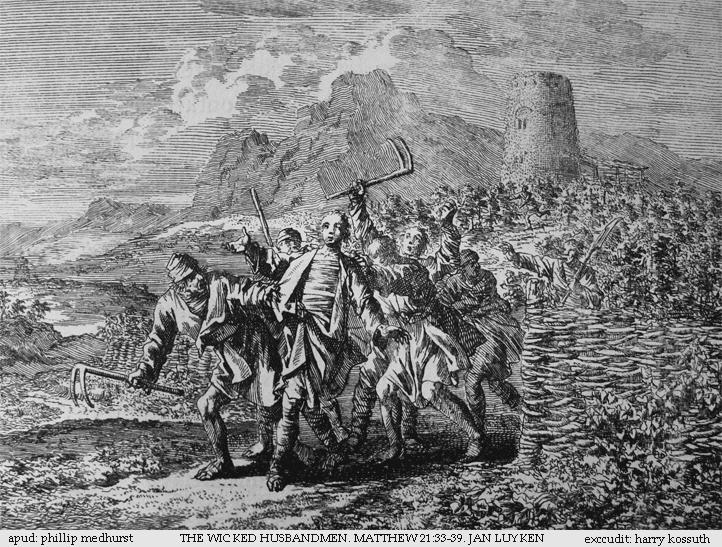
One take on the “Parable of the Wicked Husbandmen,” as told by Jesus in the Gospel…
Welcome to DORScribe, a blog about reading the Bible with an open mind.
In other words, this blog is different.
It says you can learn more by reading the Bible with an open mind, and also that the Bible was written to liberate, not shackle you it into some kind of “spiritual straitjacket.”
Such ideas run contrary to some common perceptions: 1) that too many Christians are close-minded; 2) that too many are negative; or 3) that too many think The Faith is about following their rules on pain of your “going to hell”. (See my way or the highway – Wiktionary.)
For more on such thoughts see About this Blog, which talks instead about the Three Great Promises of Jesus, to all people, and about how through those promises we can live full, rich lives of spiritual abundance and do greater miracles than Jesus, if only we open our minds…
In the meantime:
As noted in On the readings for October 5 – Part I, next Sunday’s readings are from Exodus 20, Psalm 19, Philippians 3:4b-14, and Matthew 21:33-46. “Part I” covered the Old Testament reading, and here are some highlights from the New Testament and Gospel. (The full readings are at Seventeenth Sunday after Pentecost Proper 22. )
The New Testament reading is Philippians 3:4b-14, where Paul first gave his credentials; “a Hebrew born of Hebrews; as to the law, a Pharisee; as to zeal, a persecutor of the church; as to righteousness under the law, blameless.” But he added that he gave all that up “because of the surpassing value of knowing Christ Jesus my Lord… I press on toward the goal for the prize of the heavenly call of God in Christ.” (See also Epistle to the Philippians – Wikipedia.)
Here’s a take on this week’s New Testament reading from Atlanta Bishop Robert Wright, using the metaphor of football teams specializing in either offense or defense:
Many sports have two components: offense and defense. Defense means you do everything you can to prevent your opponent from scoring… Offense is different. On offense you use your wits, experience, athleticism and skill to score… In response to the advance of modern culture some in the church have locked into a defensive mode… But the Bible says God is always on offense… God dispatches truth-telling men and women; that’s offense… God defeated death with love on the Cross… With this insight into God’s character, [it’s] no surprise Paul said, “I press on toward the goal for the prize….” Philippians 3:14
See Episcopal Diocese of Atlanta, Georgia (GA), under “For Faith,” for October 3, 2014.
In the Gospel reading, Matthew 21:33-46, Jesus told another parable, the Parable of the Wicked Husbandmen – Wikipedia. This parable was about the chief priests and Pharisees, given in Jerusalem “in the Temple during the final week before the death of Jesus.”
Wikipedia noted the “description of the vineyard is from Isaiah 5” (see the notes below), while Isaac Asimov said the passage demonstrated Jesus’ quick wit and/or His Talmudic reasoning. Asimov added that it became increasingly clear to the “powers that be” that Jesus was a threat; “Galilean backwoodsman or not, He had a quick wit and a fund of ready quotations. Yet He had to be stopped…” (Asimov, 865-67) Then Wikipedia added another interesting tidbit:
There also seems to be a direct historical reference by Jesus to Sennacherib, king of Assyria, some 700 years previous. Sennacherib conquered Babylon at the time that Hezekiah was king of Judah, and set up several rulers over the city, all of whom were overthrown. Finally, he sent his son and heir apparent Assur-nadin-sumi to rule, but after a short time, he was also killed. Finally, Sennacherib himself went to Babylon and destroyed the city stone by stone, and placed a curse on it that it should not be rebuilt for seventy years.
At any rate, the passage ends like this: “When the chief priests and the Pharisees heard his parables, they realized that he was speaking about them. They wanted to arrest him, but they feared the crowds, because they regarded him as a prophet.”
In other words, Jesus’ time here on earth was running out…

The upper image is courtesy of Parable of the Wicked Husbandmen – Wikipedia, with the caption, “The Wicked Husbandmen from the Bowyer Bible, 19th century.”
The lower image is courtesy of Book of Isaiah – Wikipedia, which included this visual interpretation of Isaiah, by Michelangelo, circa 1508-12), at the Vatican; “Vatican City: Sistine Chapel ceiling.”
As to Isaiah Chapter 5, the New International Version (NIV), labels it “The Song of the Vineyard,” while the Expanded Bible (EXB) uses the phrase, “Israel, the Lord’s Vineyard.” The English Standard Version calls it “The Vineyard of the Lord destroyed.” Here’s the Living Bible (TLB) translation of Isaiah 5:1-2:
Now I will sing a song about his vineyard to the one I love. My Beloved has a vineyard on a very fertile hill. He plowed it and took out all the rocks and planted his vineyard with the choicest vines. He built a watchtower and cut a winepress in the rocks. Then he waited for the harvest, but the grapes that grew were wild and sour and not at all the sweet ones he expected.
So whether Jesus was referring to Isaiah 5 or King Sennacherib in His parable today, He certainly knew His Scripture, or His history, or both. See also George Santayana – Wikiquote, “Those who cannot remember the past are condemned to repeat it.”
For more on the “Talmudic reasoning” demonstrated by Jesus in the Gospel, see articles including see Talmudic Humor and the Establishment of Legal Principles, and/or Talmudic Reasoning: From Casuistics to Conceptualization ….
The Isaac Asimov quotes are from Asimov’s Guide to the Bible (Two Volumes in One), Avenel Books (1981), at pages 865-67.